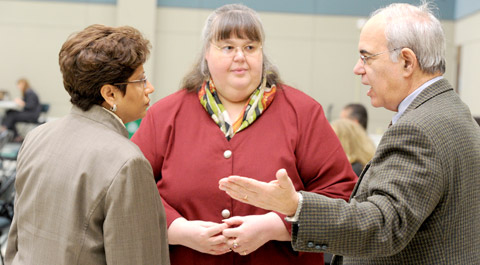Invest the time and resources to get it right.
That was the clear message NYSUT leaders delivered to members of the New New York Education Reform Commission in testimony Thursday on Long Island. NYSUT President Dick Iannuzzi and Vice President Maria Neira called for the state to stop its fixation on standardized testing, invest in Empire Partnership Schools in high needs districts, and devote the time and resources needed to implement Common Core Learning Standards and the new teacher/principal evaluation system.
"Our public school system simply does not have the capacity to implement all these reforms at such an unrealistic pace," Neira told commission members. "There are not enough resources - human and otherwise, and frustration is boiling over."
Speaking at the most well-attended regional hearing held so far by the state commission, Iannuzzi and Neira made it clear that rich student learning experiences are being sacrificed due to the testing obsession.
Iannuzzi outlined the union's proposal for Empire Partnership Schools, declaring: "The impact of poverty must be counteracted by an investment in services that recognize the schoolhouse as more than an academic setting."

Vice President Maria Neira (left) talks to Long Island leaders Antoinette Blanck and Ken Ulric. Photo by El-Wise Noisette.
NYSUT's testimony outlines a comprehensive plan to maximize student achievement and teacher effectiveness. Here's the union's news release summarizing the testimony.
NYSUT's proposals call for:
-
Empire State Partnership Schools to provide the additional support services students living in poverty - and their families - need to be successful.
-
Common sense economies that do not impact educational quality.
-
Investing the appropriate time and resources for the implementation of Common Core Learning Standards and new evaluation systems.
In a panel discussion dominated by business leaders who focused on so-called mandate relief and praised the property tax cap, Iannuzzi set the record straight . The tax cap is an "educational failure," the NYSUT president said to much applause. "It has hurt every district in the state. And it has disproportionately hurt those school districts that can least afford the pain."
He made a passionate plea for the creation of Empire State Partnership Schools, which would provide additional social, health and economic support services for students living in poverty. He cited successful community-based programs: Say Yes in Syracuse, the Harlem Children's Zone in Harlem, Community Learning Centers in New York City and the American Federation of Teachers' work in McDowell County, West Virginia. These programs offer health and dental clinics, counseling programs, mental health services, tutoring and more so students living in poverty can succeed.
"Partnership schools give us the opportunity to turn this around… to change the lives of children and make New York the Empire State for education that we have the responsibility to do together."
He also outlined common-sense economies that would not impact the educational program, including encouraging schools to opt into regional health and prescription drug consortia; expediting the merger and consolidation process for school districts; and expanding shared services through BOCES.
Neira spoke on the need for multiple measures of student performance. She explained how a pen-and-paper test cannot demonstrate if a student can play a trumpet, while a band concert or music lesson serves as a more authentic assessment. "A student is more than a test score," Neira said. "Students know it and teachers know it."
Neira said the current reforms underway - the shift to Common Core Learning Standards and the implementation of a new evaluation system - have the potential to improve teaching and learning, but only if they are done right.
"I use the word 'potential' because in order for these policy changes to have a positive effect, the commission must ensure that educators are afforded the time and resources to implement them in a way that ensures excellence," Neira said.
She called on the commission to recommend more time to implement the new Common Core standards and new evaluation system in a meaningful way. Neira said the state must make new investments in professional development, especially in the state's network of teacher centers. "It's ironic that the state's teacher centers, a known entity to be successful, have been cut the last two years," Neira said. "These centers are doing what they can with limited resources to offer different strategies and ongoing support as we shift to Common Core."
Neira called on the commission to recommend a statewide survey of teaching and learning conditions. The survey would examine issues such as how time is used in school, support for instructional practice, school facilities, family and community engagement and other topics that can inform decision-making.
Senate Education Chairman John Flanagan, R-Suffolk, asked Iannuzzi if the union would support the creation of a special commission to look into special education savings.
Any commission must without question "include the practitioner's voice," Iannuzzi said, adding that cost savings cannot impact the delivery of special needs services.
Iannuzzi noted that while the union may not always agree with state policymakers on reform strategy or how to get there, the governor, the Legislature and the members of the commission all share the same goal as NYSUT: "That every child in New York State has an equal opportunity to access an excellent public school education."